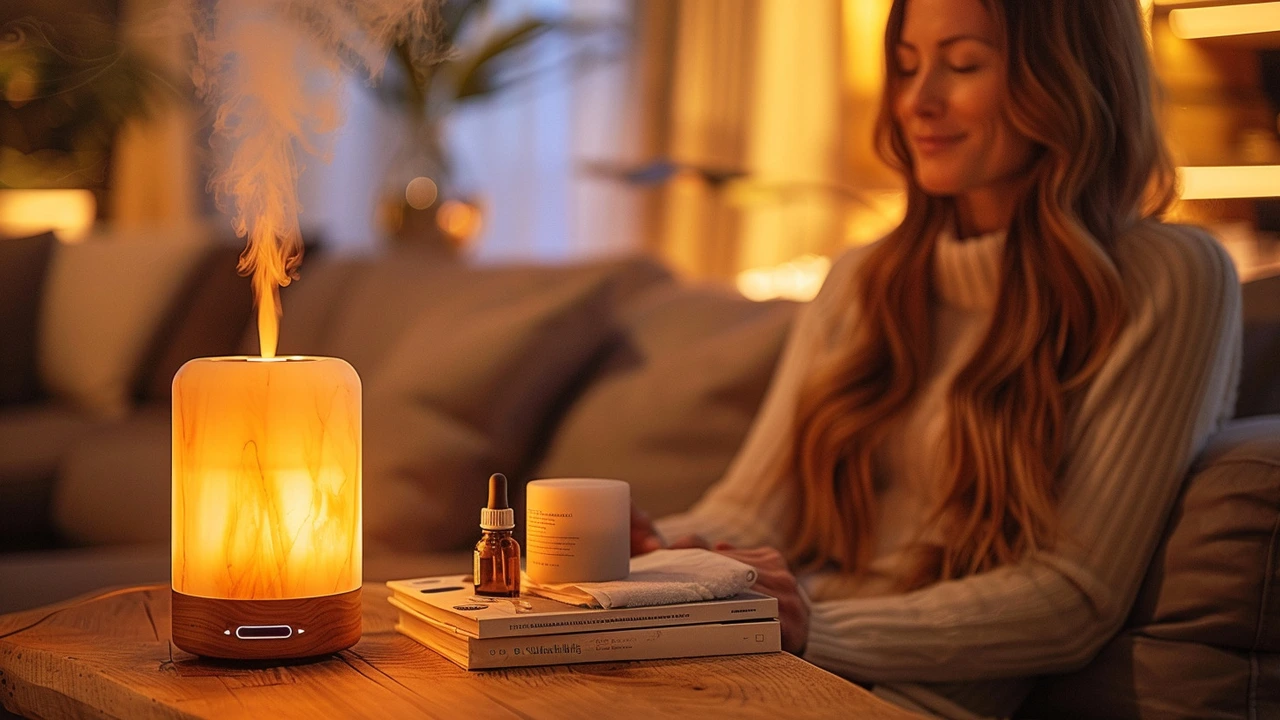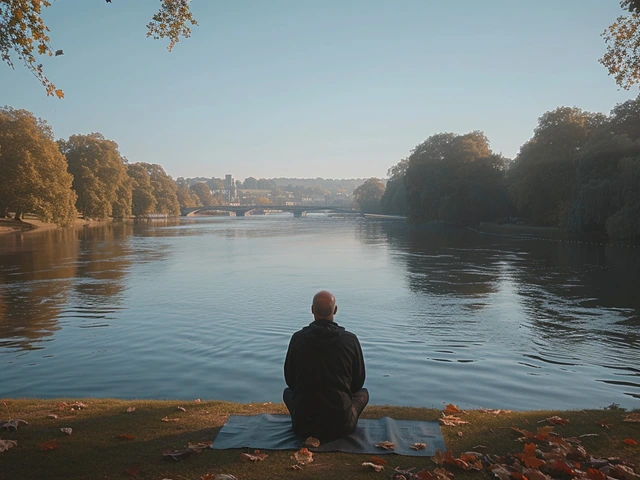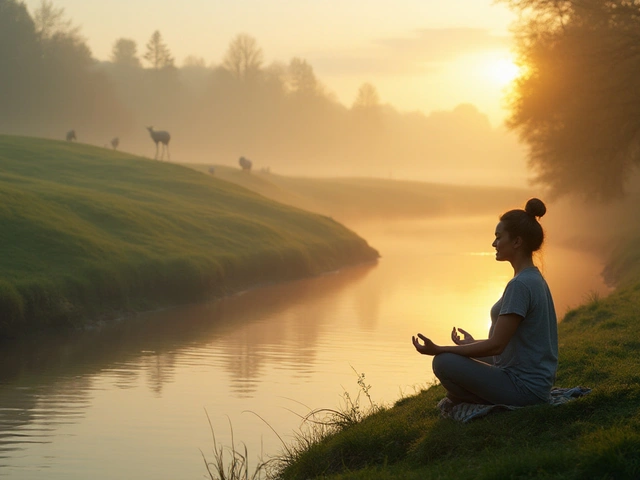
Aromatherapy utilizes the aroma emitted by essential oils extracted from plants to enhance psychological and physical well-being. When inhaled, these oils stimulate brain function while also being absorbed through the skin to offer numerous health benefits. This natural, soothing method is particularly effective in managing stress and lifting spirits.
Before diving into the specific techniques, it's important to recognize the subtle yet profound ways that scents influence our daily life. From invigorating citrus fragrances that energize us in the morning to the calming scent of lavender that prepares us for a good night's sleep, aromatherapy offers a tool for everyone to achieve a more relaxed and stress-free lifestyle.
- Understanding Aromatherapy
- Top Essential Oils for Stress Relief
- Practical Aromatherapy Techniques
- Maintaining a Stress-Free Lifestyle with Aromatherapy
Understanding Aromatherapy
Aromatherapy, a term that seems quaint and contemporary all at once, is much more than just pleasant scents in a spa environment. At its core, aromatherapy involves the therapeutic use of plant-derived, aromatic essential oils to enhance physical and psychological well-being. Historically, it roots back to ancient civilizations like Egypt, China, and India, where it was used for religious rites, as well as for medicinal and cosmetic purposes. The practice hinges on the fundamental belief that natural aroma compounds from certain oils can influence mood, cognition, and health. It is a holistic treatment, aiming for a harmonious balance between mind, body, and spirit.
To get started with aromatherapy, one initially chooses essential oils. Each plant essence is believed to offer different healing properties. For instance, lavender is famed for its ability to soothe anxiety and improve sleep quality. Conversely, peppermint oil is often chosen for its refreshing and pain-relieving effects. The choice of oil can depend on personal needs and specific ailments. Integrating aromatherapy into daily life can be as simple as adding a few drops of oil to a bath, using an oil diffuser, or applying diluted oils directly onto the skin.
Diving deeper, the process of extracting these oils is as unique as the plants themselves. Most are obtained through steam distillation, where steam helps to burst open oil-containing compartments in plants. The result is a highly concentrated liquid containing phytochemicals and the essence of the plant properties. In cases like citrus oils, mechanical methods like cold-pressing are used. The quality and type of extraction matter greatly because they influence the purity and efficiency of the oils.
Impact on Health and Mood
Scientific studies have begun to bolster anecdotal evidence around the benefits of aromatherapy. Researchers have found that certain oils like rosemary not only have a refreshing scent but are linked to improved cognitive function when their aroma is inhaled. Similarly, eucalyptus oil is noted for its respiratory benefits, aiding in decongestion and respiratory health. It's not just about the nose catching pleasant whiffs; these oils facilitate significant physiological changes that contribute to health.
"A prominent study examines the effect of lavender oil on relieving stress in nursing students during exams, noting a marked decrease in anxiety and improved mental clarity."
Understanding these mechanisms is key to achieving the most effective and personalized aromatherapy experience. By respecting the potency of these oils and following correct application methods, users can maximize the therapeutic benefits while minimizing any potential adverse reactions.
Top Essential Oils for Stress Relief
The seductive scents of essential oils have been revered for their healing properties since ancient times. Delving into the realm of these aromatic essences, several have been identified as particularly beneficial for tackling stress and anxiety. The use of essential oils can be a simple, natural way to reduce daily stress and enhance emotional equilibrium.
One of the most acclaimed oils for its anti-stress properties is Lavender. Known for its soothing and sedative effects, lavender oil is often used to enhance relaxation and improve sleep quality. Studies have shown that inhaling lavender can significantly decrease blood pressure and heart rate, setting a calmer stage for both mind and body.
According to Dr. Sarah Parker, a clinical psychologist specializing in natural therapies, 'The remarkable range of effects that lavender oil can induce is invaluable in managing stress and anxiety.'
Another powerhouse in the fight against tension is Bergamot. This citrusy scent is more than just a flavour enhancer. It's particularly effective in reducing the cortisol levels and helps in alleviating symptoms of stress and anxiety. The fresh, invigorating scent of bergamot is also a mood lifter and can help relieve feelings of depression that often accompany chronic stress.
Chamomile, best known for its role in calming teas, also takes center stage as a stress-relieving essential oil. It promotes overall calmness and relaxation, making it a favorite for pre-sleep routines. When inhaled, chamomile promotes greater connectivity within the brain's emotional center, the amygdala, reducing feelings of anxiety and initiating a peaceful state quicker.
Last but not least, Ylang Ylang is another hero in the aromatherapy arsenal. It’s celebrated not only for its lovely floral aroma but also for its ability to uplift mood and reduce heart palpitations. It's a common ingredient for those seeking a therapeutic escape into tranquility.
Incorporating these essential oils into your daily routine can be a delightful and effective strategy to combat stress. Whether diffused, inhaled directly, or mixed with a carrier oil for massage, each of these oils offers a natural path to relaxation. By attuning to the subtleties of each scent, one can harness the extraordinary power of aromatherapy to foster a serene, stress-free atmosphere.
Practical Aromatherapy Techniques
Embracing aromatherapy in your daily life doesn't require expansive knowledge or a vast collection of oils. Start simple, with a focus on stress relief and cultivating a serene environment. Aromatherapy can be remarkably easy to incorporate into your routine using several straightforward techniques. One popular method is the use of an essential oil diffuser, which disperses the oils into the air, allowing you to breathe in the therapeutic aromas effortlessly as you go about your day. The scent molecules in essential oils are believed to stimulate parts of your brain that play a role in emotions and behaviors, thus easing stress.
Another effective technique involves creating your own personal aromatic spray. This can be done by mixing water with a few drops of an essential oil like lavender or chamomile in a spray bottle. Mist your living spaces, or even your pillow before bedtime, to infuse the area with calmness. For those constantly on the move, consider dabbing a small amount of oil onto a handkerchief or a bracelet designed for essential oils, so you can carry the soothing effects with you throughout the day.
For dedicated spaces like a home office or bedroom, setting up reed diffusers can make a big difference. These diffusers don’t require heat; they use reed sticks to draw the oil up and release it into the air steadily, providing a constant source of stress relief. Bathing with essential oils can also offer a deeply immersive experience. Adding a few drops of oils such as eucalyptus or rosemary to bathwater can help soothe tired muscles and calm the mind, making it an excellent ritual before bedtime to ensure a good night's sleep.
The practice of aromatherapy doesn’t end with personal use. It can be shared in a living space with candles made from essential oils, which when lit, release calming scents that purify the air and create a tranquil ambiance. As practical as these techniques are, it's important to remember that the potency of essential oils means a little goes a long way. So whether you’re diffusing, dabbing, or bathing, a few drops are often enough to achieve the desired effect.
Maintaining a Stress-Free Lifestyle with Aromatherapy
Integrating aromatherapy into your daily life isn't just about occasionally diffusing lavender or peppermint oil; it's about building a consistent habit that enhances your daily environment and personal care routines. When you actively make aromatherapy a part of your lifestyle, its benefits multiply, helping you to manage stress more effectively. The key is to be mindful of your sensory experiences and to tailor them to support your emotional and physical well-being.
To begin, establish a morning ritual. Starting your day with a refreshing aroma can invigorate your senses and set a positive tone. Consider oils like eucalyptus or grapefruit, which are known for their invigorating properties. Place a few drops in your shower or use an oil diffuser in your breakfast area. This simple act can drastically reduce morning fatigue and boost your mood. Transitioning these practices to your workplace or your study by keeping a small personal diffuser at your desk can also maintain this heightened level of focus and calmness through your most productive hours of the day.
When it comes to winding down, create tranquil evenings with scents that promote relaxation. Oils such as lavender, chamomile, and bergamot are excellent for calming the mind and preparing the body for sleep. You might add a few drops to your evening bath or use them in a bedside diffuser. It's the consistency of these practices that supports a long-term reduction in stress levels and overall improvements in sleep quality and mental health. Pair these aromatherapy practices with other stress-management techniques like meditation or gentle yoga, and you will likely notice an enhanced mood and improved sleep patterns.
Consider also the use of aromatherapy in your seasonal routines. Different seasons might lend themselves to different scents: the freshness of lemon or peppermint might uplift during darker, winter months, while floral scents like rose or jasmine can enhance the joy of spring and summer. Adjusting your aromatherapy practices according to the time of year can help keep your mood balanced throughout the changing seasons.
Finally, remember that maintaining a stress-free lifestyle with aromatherapy is a highly individual journey. What works wonderfully for one person might be less effective for another. It's important to experiment with different oils and methods of application to discover what blends and techniques resonate best with your body's needs and your lifestyle. An open approach to the various ways aromatherapy can be integrated into different aspects of your life will yield the best results in managing stress and enhancing overall wellness.





